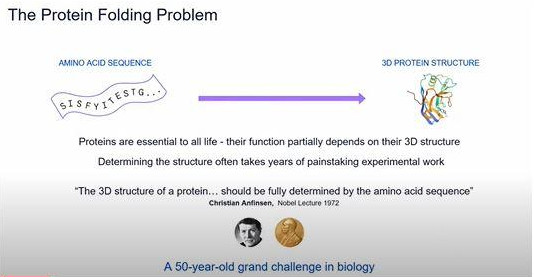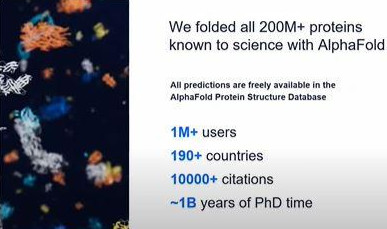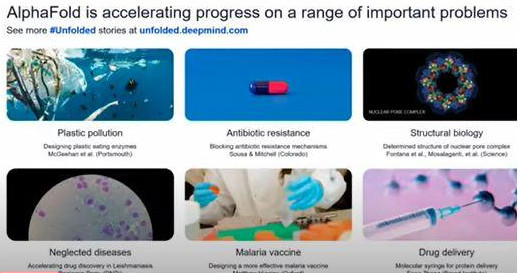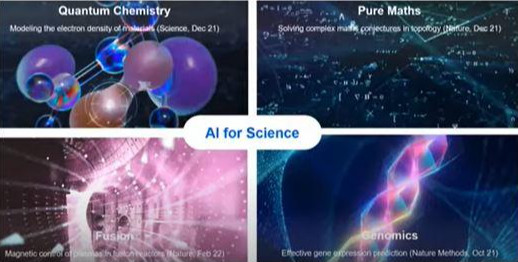
OVERVIEW
MANAGEMENT
PERFORMANCE
POSSIBILITIES
CAPITALS
ACTIVITIES
ACTORS
BURGESS
|
AI
HASSIBIS ... UK BASED AI GENIUS Hassibis White House Pcast Original article: Peter Burgess COMMENTARY Peter Burgess | ||
|
Hassibis White House Pcast 5/19/23
https://www.youtube.com/live/gZb7Yr4C8po?feature=share&t=715 I spent my whole career working on AI because I believe in the incredible potential it has to help us solve some of the biggest challenges facing humanity today from curing diseases to creating renewable energy sources of the future but of course because of its power we also need to make sure we use it responsibly and handle it with exceptional care 12:19 

AlphaGo - Mastering Go through self-learning /// Guiding the Search with the Model at the deepmind we started off working on AI using games mostly because it was a very efficient way to explore purpose and AI algorithms in an efficient way; probably our most famous program is called alphago that was the first program to beat the world champion at go in 2015. but not only did It win the match, importantly it came up with new strategies never seen before even though people have played go for thousands of years including professionally for hundreds of years so it's this kind of potential that I think is very exciting about this new General learning AI at the heart of all the systems that we've built . Why they're so effective is that basically these systems learn a model of the environment they're put in so if that's a go game they learn a model of go positions and what kinds of moves are going to likely to be good and therefore to look at and that model is to guide a search or planning function and because the models the environment very well it allows this search to be very efficient and that means we can use these kinds of systems in situations where there are an enormous number of combinations so for example in go there are around 10 to the power 170 possible positions in go - that's far to many to analyse in a Brute Force manner so we needed to have this kind of model to allow the search to be tractable and to allow alphago to find these amazingly strong moves and strategic ideas so the exciting thing now is that over the last few years the sophistication of these types of AI systems have got to the point where we can now apply it to imported real world problems and my particular passion is applying it to Scientific problems to try and accelerate scientific discovery and the main first big problem we applied it to is called the protein folding problem and proteins are essential to all life they're the workhorses of biology and their function what they do in the body partially depends on their 3D structure and determining this structure experimentally often takes years of painstaking work in the laboratory. What the protein folding problem is about is can we predict the 3D structure of a protein directly from its one-dimensional amino acid sequence : basically a series of letters can we predict the 3D structure and this was first conjectured by Christian Anfinsen in his Nobel lecture 1972 https://www.nobelprize.org/prizes/chemistry/1972/summary/ . 
SO our solution to this was building our program Alphafold to predict the 3D structure of the proteins down to Atomic accuracy ie within the tolerance of the width of an atom and that is accurate enough for biologists to use Downstream and on all sorts of tasks involved in understanding disease and potentially designing drugs So over the course of the 18 months we used Alphafold. which can predict the structure of a protein in a matter of seconds -the result is the structure of all 200 million proteins that are known to science and we released all of those structures freely in the alpha protein structure database that we created in collaboration with the European bioinformatics Institute and to date the sort of impact of alpha fold has been hugely gratifying to see : there's been over a million researchers have now used AlphaFold, from pretty much every country around the world, and our methods paper has now been cited over 10 000 times in just 18 months and my biology professors always used to tell me the rule of thumb of finding the structure of a protein in the experimental way you know would normally take a PhD student their entire PhD ;so maybe four or five years and 200 million protein represents nearly a billion years of PhD time 
actually the the broad things alphafold have been used for in the biological community range from designing enzymes that are more efficient at eating plastic pollution to drug Discovery in areas like: 1 antibiotic resistance 2 neglected diseases like leashmenasis 3 developing vaccines for malaria to fundamental biology research for example finding the structure of the Nuclear Pore Complex one of the biggest proteins in the body and developing new types of delivery mechanisms using protein syringes https://www.techtimes.com/articles/289709/20230329/deepminds-alphaf... I think this is just the beginning of what we're going to see AI being used in science in the last couple of years we've had breakthroughs in fields as far afield as quantum chemistry and solving some important conjectures in pure mathematics to controlling the plasma in a fusion reactor to work on gene expression prediction so while this is an incredibly exciting time and I think we're going to see some amazing advances uh that have been powered by AI in the next five to ten years we of course need to be very responsible and transformative Technologies like AI deserve exceptional care 
and our sort of Mantra is that we need to be bold and responsible : we need to be brave about how we try and apply these things because of the enormous potential for positive impact these Technologies can have but we also need to be responsible with that at the same time think ethics and safety has been Central to our mission a deep mind and at Google from the beginning 

when we started back in 2010 we planned for Success almost nobody was talking about AI and now you know in short 10 years it seems to be the biggest thing that everyone is talking about - but we plan for success and we sort of understood in the beginning that if we were successful as a field with these types of Technologies the impact would be profound and therefore we had to think about ethics and safety from the very beginning and we've always had an Ethics Charter and that's now developed and evolved into Google's published AI principles and we continue to try and provide sort of responsible and thoughtful leadership on a range of topics from AI strategy to risk to ethics and safety in engagement with the entire Community thank you
| The text being discussed is available at | and |